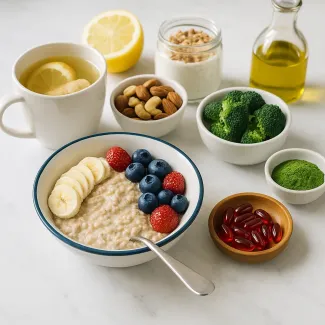
Year-Round Support Strategies for a Resilient Immune System
How to naturally maintain strong immunity in everyday life
Supporting your immune system is not just something to think about during the winter or flu season. Your immune health is the foundation of overall well-being and deserves consistent attention throughout the year. With the pressures of modern life—stress, lack of sleep, processed foods, pollution—it becomes even more important to integrate daily habits that reinforce your natural defense mechanisms. In this article, we’ll explore evidence-based and practical daily rituals that can support a healthy immune system at any age and in any season.
Morning hydration: activating your body's internal defense
One of the simplest yet most overlooked immune-supporting habits is drinking water first thing in the morning. After a night of sleep, your body is in a mild state of dehydration, which can slow down lymphatic drainage and reduce the efficiency of cellular repair. Begin each day with a glass of warm water with lemon, which helps alkalize the body, stimulate digestion, and flush out accumulated toxins.
Adding a pinch of sea salt or electrolyte drops can help restore minerals, especially after a night of sweating or poor sleep. Staying hydrated during the day ensures that the mucous membranes of your nose and throat stay moist, which is crucial for trapping pathogens before they can reach deeper into your body.
Nourishing breakfasts with immune-friendly ingredients
What you eat in the first few hours of your day can have a major impact on how your immune system functions. Focus on anti-inflammatory and nutrient-dense foods, such as:
- Oats rich in beta-glucans that support white blood cells.
- Berries, especially blueberries and blackcurrants, packed with antioxidants and vitamin C.
- Nuts and seeds (like sunflower, pumpkin, and flaxseeds) that provide zinc, vitamin E, and essential omega-3 fatty acids.
Adding fermented foods like kefir or plain yogurt delivers beneficial probiotics that help balance the gut microbiome—one of the most important regulators of immunity.
Sunlight and morning movement: resetting your body’s rhythm
One of the most powerful and underused immune boosters is natural sunlight. Just 10–20 minutes of morning sunlight exposure helps stimulate the production of vitamin D, a crucial nutrient for immune function. It also supports circadian rhythm regulation, which improves sleep quality and hormone balance.
Combine this with light morning movement, such as walking, stretching, or yoga, to stimulate blood flow and lymphatic circulation. This ensures that immune cells can travel efficiently through your body, identifying and responding to threats faster.
Prioritizing gut health throughout the day
Your gut is home to nearly 70% of your immune system. An imbalanced microbiome can lead to increased inflammation, autoimmune reactions, and weakened resistance to infections. To keep your digestive tract in top shape, make sure you:
- Eat a variety of fiber-rich vegetables, such as leafy greens, sweet potatoes, and artichokes.
- Include prebiotics (from onions, garlic, asparagus) and probiotics (from sauerkraut, kimchi, miso).
- Avoid excessive sugar and ultra-processed foods that disrupt beneficial bacteria.
Try to eat slowly and mindfully, allowing your digestive enzymes to work effectively and preventing gut stress, which can trigger inflammatory responses.
Breathwork and mindful pauses: resetting your nervous system
Chronic stress is a silent suppressor of immune function. Elevated cortisol levels interfere with the production and effectiveness of white blood cells, impairing your ability to fight infections. Incorporate breathing exercises throughout your day—especially during transitions between tasks.
Simple techniques like box breathing (inhale 4, hold 4, exhale 4, hold 4) or long exhalations (inhale 4, exhale 8) help activate the parasympathetic nervous system, reducing stress and calming inflammation. Take short pauses during the day to reconnect with your body and shift out of constant fight-or-flight mode.
Midday nutrition: building immune resilience through meals
Lunch is a great opportunity to load up on immune-supporting nutrients. Opt for dishes that include:
- Cruciferous vegetables (broccoli, cauliflower, cabbage) for their glutathione-boosting properties.
- Lean proteins (chicken, lentils, tofu) which provide amino acids critical for antibody production.
- Healthy fats (avocados, olive oil, fatty fish) to support cell membrane integrity.
Incorporating spices like turmeric, ginger, cumin, and black pepper can further enhance the anti-inflammatory profile of your meals, promoting cellular regeneration and natural detox pathways.
The power of rest and recovery breaks
Your immune system needs downtime to regenerate. Schedule intentional rest periods between active work sessions. These can include lying down for 10 minutes, practicing gentle stretching, or simply enjoying silence. Avoiding overstimulation from screens, caffeine, or constant notifications during breaks allows your body to shift into healing mode.
Introduce adaptogenic teas such as holy basil (tulsi), ashwagandha, or reishi mushroom to calm the nervous system and promote adrenal recovery—key to preventing immune burnout.
Evening wind-down: the gateway to deep immune repair
The evening ritual is where your immune system prepares for regeneration. Create a sleep-friendly routine that supports melatonin production and detox processes. Key strategies include:
- Avoid blue light exposure from screens at least 90 minutes before bed.
- Use dim lighting or red-light lamps after sunset.
- Consume a light dinner, ideally rich in tryptophan (e.g. turkey, oats, bananas), magnesium (e.g. spinach, almonds), and complex carbs.
Avoid alcohol and heavy meals late at night, as they can disrupt liver function and impair overnight immune repair.
Creating a consistent sleep environment
Sleep is the ultimate immune regulator. Chronic sleep deprivation lowers production of natural killer cells, impairs cytokine response, and increases systemic inflammation. Optimize your sleep by:
- Keeping a consistent bedtime and wake-up time, even on weekends.
- Using blackout curtains and maintaining a cool room temperature.
- Incorporating calming rituals like journaling, lavender essential oil, or gentle music.
Aim for 7–9 hours of uninterrupted sleep to allow full T-cell activation and antibody production.
Weekly and seasonal detox habits
Your immune system benefits from gentle, regular detoxification—not harsh cleanses. Incorporate weekly detox rituals, such as:
- Drinking dandelion root or nettle tea to support liver and kidney function.
- Engaging in sauna sessions or hot baths with Epsom salts to stimulate lymphatic flow and sweating.
- Using dry brushing before showers to stimulate skin-based immune receptors and circulation.
Adjust your immune support based on the season—increase warming herbs and vitamin C intake in colder months, and hydrate more aggressively in summer.
Strengthening your immune mindset
Emotional and mental states have a direct impact on immunity. Feelings like gratitude, purpose, and optimism have been shown to enhance immune markers, while loneliness and despair can suppress them. Build a resilient mindset through:
- Daily gratitude journaling.
- Connecting regularly with supportive people.
- Practicing kindness and generosity, which activate feel-good hormones that influence immune pathways.
Immune-boosting supplements (when necessary)
While food should always be your foundation, certain targeted supplements can offer additional support, especially during times of increased stress, travel, or exposure to illness. These include:
- Vitamin D3 (especially in winter months or for indoor lifestyles).
- Zinc for its role in immune cell signaling and inflammation control.
- Vitamin C for antioxidant protection and T-cell function.
- Elderberry, quercetin, and echinacea as seasonal immune modulators.
Always consult a healthcare professional before adding new supplements to your routine, especially if you have pre-existing conditions or take medications.
Movement as a daily immune stimulator
Physical activity helps mobilize immune cells, enhance circulation, reduce chronic inflammation, and regulate hormones. However, more is not always better—intense training without recovery can suppress immunity. Focus on:
- Moderate aerobic activity like brisk walking, cycling, or swimming for 30–45 minutes a day.
- Including resistance training 2–3 times a week to support muscle and metabolic health.
- Practicing gentle movement on rest days, such as stretching, tai chi, or slow dance.
Avoid overtraining and listen to your body’s recovery needs.
Reconnecting with nature for immune restoration
Spending time in natural environments—forests, mountains, oceans—can significantly lower stress hormones and increase immune resilience. The concept of “forest bathing” (shinrin-yoku) has been shown to boost natural killer cell activity, thanks to the inhalation of beneficial phytoncides from trees.
Make nature exposure part of your weekly or daily ritual—even a short walk in a park or time gardening can shift your immune biology in a positive direction.
Digital hygiene for immune protection
Your digital habits can impact your health more than you might expect. Constant information exposure, blue light at night, and digital overstimulation all contribute to stress and circadian disruption, weakening immunity. Improve your digital hygiene by:
- Setting boundaries for screen time—especially before bed.
- Turning off non-essential notifications.
- Taking tech-free walks or meals.
Make space for analog habits like reading physical books, hand-writing notes, or listening to soothing music.
Cultivating immune rituals with your family or household
Routines are more sustainable when shared. Involve your family, roommates, or children in creating immune-supportive habits that benefit everyone. Examples include:
- Preparing healthy meals together using seasonal ingredients.
- Taking post-dinner walks or doing light stretches as a group.
- Practicing gratitude circles or quiet moments before sleep.
Creating these shared moments fosters both emotional connection and physical health.
The role of cleanliness and environment
A healthy immune system does not mean a sterile life. Over-sanitization may reduce microbial exposure necessary for immune education, especially in children. Maintain a balanced approach to hygiene:
- Wash hands thoroughly but not obsessively.
- Allow for outdoor play and contact with pets or soil.
- Use natural cleaning agents that don’t disrupt indoor air quality.
Support your body’s natural interaction with the environment, rather than shielding it entirely.
Building immune resilience through rhythm and routine
Ultimately, immune resilience is not about perfection, but about consistency and rhythm. By aligning your life with natural cycles—waking with light, eating with seasons, moving daily, resting deeply—you create a stable terrain for your immune system to thrive.
Don’t think of immune support as an emergency fix. Make it a living ritual, integrated into how you eat, breathe, move, sleep, and relate to the world around you.





